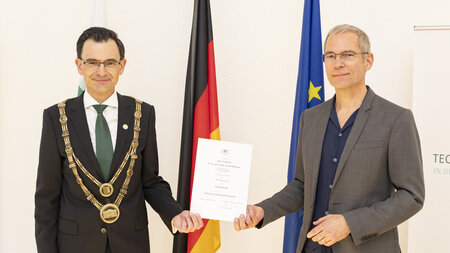M.Sc. Daniel Brand

-
Telefon:+49 371 531-38957
-
E-Mail:
-
Sprechzeiten:Nach Vereinbarung. Bitte kontaktieren Sie mich per E-Mail.
Folgende Bereiche liegen hierbei im Schwerpunkt:
- Kognitive Modellierung
- Prädiktive Modellierung menschlichen Schlussfolgerns
- Syllogistisches Schließen
- Informationssysteme
Berufserfahrung
- seit 02/2022: Wissenschaftlicher Mitarbeiter; TU Chemnitz; Professur Prädiktive Verhaltensanalyse
- 02/2021 - 07/2021: Wissenschaftlicher Mitarbeiter; Syddansk Universitet (SDU); Abteilung für Design und Kommunikation
- 07/2020 - 02/2022: Wissenschaftlicher Mitarbeiter; Albert-Ludwigs-Universität Freiburg; Cognitive Computation Lab
- 05/2017 - 06/2020: Wissenschaftlicher Mitarbeiter; Albert-Ludwigs-Universität Freiburg; Center for Cognitive Science/Cognitive Computation Lab
Bildungsweg und Qualifikationen
- 2016: MSc. Computer Science, Albert-Ludwigs-Universität Freiburg
- 2012: BSc. Computer Science, Albert-Ludwigs-Universität Freiburg
- SS 2022: Dozent; Seminar: Kognitive Ergonomie; TU Chemnitz
- SS 2021: Assistent; Seminar: Cognitive Modeling; Cognitive Computation Lab; Albert-Ludwigs-Universität Freiburg
- SS 2020: Assistent; Seminar: Cognitive Modeling; Cognitive Computation Lab; Albert-Ludwigs-Universität Freiburg
- WS 2019/20: Assistent; Seminar: Cognitive Reasoning: Methods, Algorithms, and Statistics to Discern Human from Artificially Generated Data; Cognitive Computation Lab; Albert-Ludwigs-Universität Freiburg
- SS 2019: Assistent; Seminar: Cross-Domain Modeling of Human Cognition; Cognitive Computation Lab; Albert-Ludwigs-Universität Freiburg
- SS 2014: Tutor; Cloud Computing; Department for Databases and Information Systems; Albert-Ludwigs-Universität Freiburg
- SS 2012: Tutor; Software Engineering; Department for Software Engineering; Albert-Ludwigs-Universität Freiburg
Aktuelle Projekte
- Automatische Prozessmodellgenerierung für Kognitive Modellierung
Vorherige Projekte
- CCOBRA (Cognitive COmputation for Behavioral Reasoning Analysis) Framework: Online predictive modelling of human reasoning. [Website] [GitHub]
- PVA Webexperiment Tools: Sammlung an Vorlagen und Aufgaben für die einfachere Erstellung von Webexperimenten [GitHub]
- Syllogistic Task Predictor: Interaktive Prädiktions-Umgebung für syllogistisches Schlussfolgern [Website]
- Spatial Demonstrator: Interaktive Umgebung für räumliche Schlussfolgerungs-Aufgaben [Website]
- pyTailorshop: Implementation der Tailorshop-Simulation in Python [GitHub]
- Dames, H., Brand, D., & Ragni, M. (2022). Evidence for Multiple Mechanisms Underlying List-Method Directed Forgetting. In J. Culbertson, A. Perfors, H. Rabagliati, & V. Ramenzoni (Eds.), Proceedings of the 44th Annual Meeting of the Cognitive Science Society (pp. 519–525).
- Brand, D., Riesterer, N., & Ragni, M. (2022). Model-Based Explanation of Feedback Effects in Syllogistic Reasoning. Topics in Cognitive Science, 14(4), 828-844. doi: 10.1111/tops.12624. [GitHub]
- Mittenbühler, M., Brand, D., & Ragni, M. (2022). Do Models of Syllogistic Reasoning extend to Generalized Quantifiers?. In T. C. Stewart (Ed.), Proceedings of the 20th International Conference on Cognitive Modeling (pp. 189–195). Applied Cognitive Science Lab, Penn State: University Park, PA. [PDF] [GitHub]
- Todorovikj, S., Brand, D., & Ragni, M. (2022). Predicting Algorithmic Complexity for Individuals. In T. C. Stewart (Ed.), Proceedings of the 20th International Conference on Cognitive Modeling (pp. 240–246). Applied Cognitive Science Lab, Penn State: University Park, PA. [PDF]
- Kettner, F., Heinrich, E., Brand, D., & Ragni, M. (2022). Reverse-Engineering of Boolean Concepts: A Benchmark Analysis. In T. C. Stewart (Ed.), Proceedings of the 20th International Conference on Cognitive Modeling (pp. 164–169). Applied Cognitive Science Lab, Penn State: University Park, PA. [PDF]
- Brand, D., Dames, H., Puricelli, L., & Ragni, M. (2022). Rule-Based Categorization: Measuring the Cognitive Costs of Intentional Rule Updating. In J. Culbertson, A. Perfors, H. Rabagliati, & V. Ramenzoni (Eds.), Proceedings of the 44th Annual Meeting of the Cognitive Science Society (pp. 2810–2817). [PDF] [GitHub]
- Brand, D., Mittenbühler, M., & Ragni, M. (2022). Generalizing Syllogistic Reasoning: Extending Syllogisms to General Quantifiers. In J. Culbertson, A. Perfors, H. Rabagliati, & V. Ramenzoni (Eds.), Proceedings of the 44th Annual Meeting of the Cognitive Science Society (pp. 722–728). [PDF] [GitHub]
- Todorovikj, S., Kettner, F., Brand, D., Beggiato, M., & Ragni, M. (2022). Predicting Individual Discomfort in Autonomous Driving. In J. Culbertson, A. Perfors, H. Rabagliati, & V. Ramenzoni (Eds.), Proceedings of the 44th Annual Meeting of the Cognitive Science Society (pp. 3103–3109).
- von Stülpnagel, R., Findler, F., & Brand, D. (2022). Census-Based Variables Are Informative about Subjective Neighborhood Relations, but Only When Adjusted for Residents’ Neighborhood Conceptions. Sustainability, 14(8), 4434. doi: 10.3390/su14084434.
- "Using Cross-Domain Data to Predict Syllogistic Reasoning Behavior" @ CogSci 2025. Online, August 2025. [poster]
- "Effect of Response Format on Syllogistic Reasoning" @ CogSci 2023. Online, July 2023. [poster]
- "Uncovering iconic patterns of syllogistic reasoning: A clustering analysis" @ 21th International Conference on Cognitive Modeling. Online, July 2023. [slides]
- "Do models of syllogistic reasoning extend to generalized quantifiers?" @ 20th International Conference on Cognitive Modeling. Online, July 2022. [slides]
- "Model-based explanation of feedback effects in syllogistic reasoning" @ 19th International Conference on Cognitive Modeling. Online, July 2021. [talk]
- "Unifying models for belief and syllogistic reasoning" @ 43th Annual Meeting of the Cognitive Science Society. Online, July 2021. [slides] [poster]
- "How usable is Galaxy? A usability evaluation of Galaxy" @ 2019 Galaxy Community Conference (GCC2019). Freiburg, Germany, July 2019. [poster]
- "Extending TransSet: An Individualized Model for Human Syllogistic Reasoning" @ 18th International Conference on Cognitive Modeling. Online, July 2020. [short slides] [talk]






